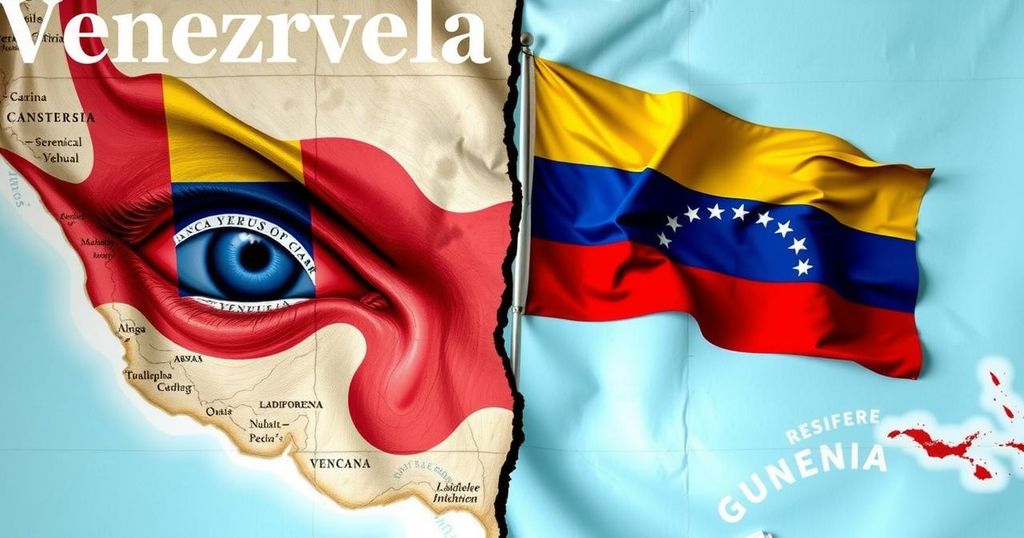Guyana has accused Venezuela of violating the Argyle Agreement and ICJ order regarding their border dispute. The Guyanese government is particularly concerned about Venezuela’s recent claims over the Essequibo region, asserting these actions threaten Guyana’s sovereignty and undermine international law. Guyana reaffirms its commitment to the ICJ process and seeks to resolve the dispute peacefully.
The Government of Guyana has expressed significant concerns regarding recent actions and statements made by the Government of Venezuela, which it deems as clear violations of both the Argyle Agreement and the binding order issued by the International Court of Justice (ICJ). Both the Argyle Agreement and ICJ order came into effect in December 2023, establishing commitments between the two nations to refrain from escalating their territorial dispute.
In a May 2023 statement, the Ministry of Foreign Affairs of Guyana highlighted issues arising from President Nicolás Maduro’s announcement concerning the election of a governor for the Guayana Esequiba region. This assertion is viewed as a unilateral violation of the agreements, arguing that it undermines the spirit of dialogue intended for peaceful coexistence.
The Ministry asserted, “This unilateral action disregards the spirit of the Argyle Agreement, undermines the agreed framework for dialogue and peaceful coexistence, and significantly escalates tensions between our nations.” Furthermore, it emphasized that conducting elections in the contested area infringes upon Guyana’s sovereignty and violates principles of international law as outlined in the United Nations Charter.
Amidst this escalating tension, Venezuela’s previous referendum asserting claims over Essequibo further complicates the matter. The report indicated that a significant portion of eligible voters in Venezuela purportedly supported the claim. However, the ICJ has previously cautioned against actions that may be tantamount to annexation of the contested territory.
Guyana’s government reiterated that the ICJ’s order from December 1, 2023, instructed Venezuela to refrain from altering the status quo in the disputed territory and to avoid actions that might exacerbate the ongoing dispute. In light of these developments, the Government of Guyana has expressed its intent to seek additional provisional measures from the ICJ should Caracas proceed with any plans of conducting elections in the disputed area.
The Ministry of Foreign Affairs has categorically rejected Venezuela’s claims over the Essequibo region and reaffirmed its commitment to pursuing resolution through the ICJ. Guyana also called for Venezuela to halt any actions that contradict the Argyle Agreement and the increasingly relevant ICJ ruling while urging both nations to recommit to principles of international law and dialogue. Additionally, the government seeks assurances from Venezuela regarding adherence to international obligations in resolving this long-standing controversy peacefully.
The border dispute between Guyana and Venezuela traces its roots back to historical territorial claims and an arbitral award determined in 1899, which established boundaries between the two nations. This longstanding disagreement has since evolved, with both countries placing increasing emphasis on regional and international agreements to manage tensions. Recent developments have rekindled disputes concerning the oil-rich Essequibo region, which constitutes a significant portion of Guyana’s territory and populations residing therein. The binding order from the ICJ and the Argyle Agreement were established in late 2023 to facilitate peaceful dialogue and resolution. As such, both nations must navigate complex legal and diplomatic challenges, with the international community observing their compliance and actions in response to the evolving situation.
The ongoing border dispute between Guyana and Venezuela remains a critical concern for both nations as well as international observers. Guyana’s government has firmly opposed recent Venezuelan actions that it perceives as unlawful encroachments upon its sovereignty, reiterating its commitment to the ICJ’s adjudication. Diplomatic dialogues appear increasingly essential in easing tensions, with Guyana urging Venezuela to respect international law and adherence to the agreements aimed at preventing escalation. The resolution of the dispute hinges on both parties honoring their commitments to established legal frameworks and engaging in constructive discussions moving forward.
Original Source: jamaica-gleaner.com






